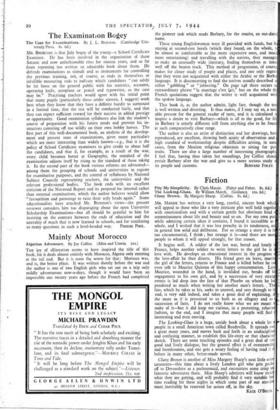The Examination Bogey
MR. BRERETON is that July bogey of the young—a School Certificate Examiner. He has been involved in the organisation of these Satanic and now unfashionable rites for sixteen years, and so far from repenting has written an admirable book about them. He defends examinations as stimuli and as instruments for controlling the previous training, not, of course, as ends in themselves or infallible measuring rods to indicate which candidates " can safely be let loose on the general public with his statistics, accounts, operating knife, aeroplane or pencil and typewriter, as the case may be." Practising teachers would agree with his initial point that many pupils (particularly those under sixteen, I suggest) work best when they know that they have a definite hurdle to surmount in a limited time, that the test will be conducted fairly, and that they can expect sufficient reward for their success in added prestige or opportunity. Good examination syllabuses also link the student's course of preparation with his future needs and prevent his in- structors cantering off too wildly on their own hobby horses. The first part of this well-documented book, an analysis of the develop- ment and present state of examinations, gives many particulars which are more interesting than widely known—e.g., that it is the policy of School Certificate examiners to give credit to about half the candidates, and that if, for example, as a result of the war, every child becomes better at Geography, the standard of the examination adjusts itself by rising to the standard of those taking it. In the second part of the book various reforms are advocated— among them the grouping of schools and universities in regions for examination purposes, and the control of syllabuses by National Subject Councils representing teachers, the universities and - the relevant professional bodies. The book ends with an excellent criticism of the Norwood Report and its proposal for internal rather than external examinations, which the author believes would allow "favouritism and patronage to raise their ugly heads again." Some educationalists have attacked Mr. Brereton's views—the present reviewer considers him too disparaging about the open University Scholarship Examinations—but all should be grateful to him for insisting on the contrast between the ends of education and the unreality of much that is now learned in schools, and for ventilating so many questions in such a level-headed way. PHOEBE POOL.


























 Previous page
Previous page